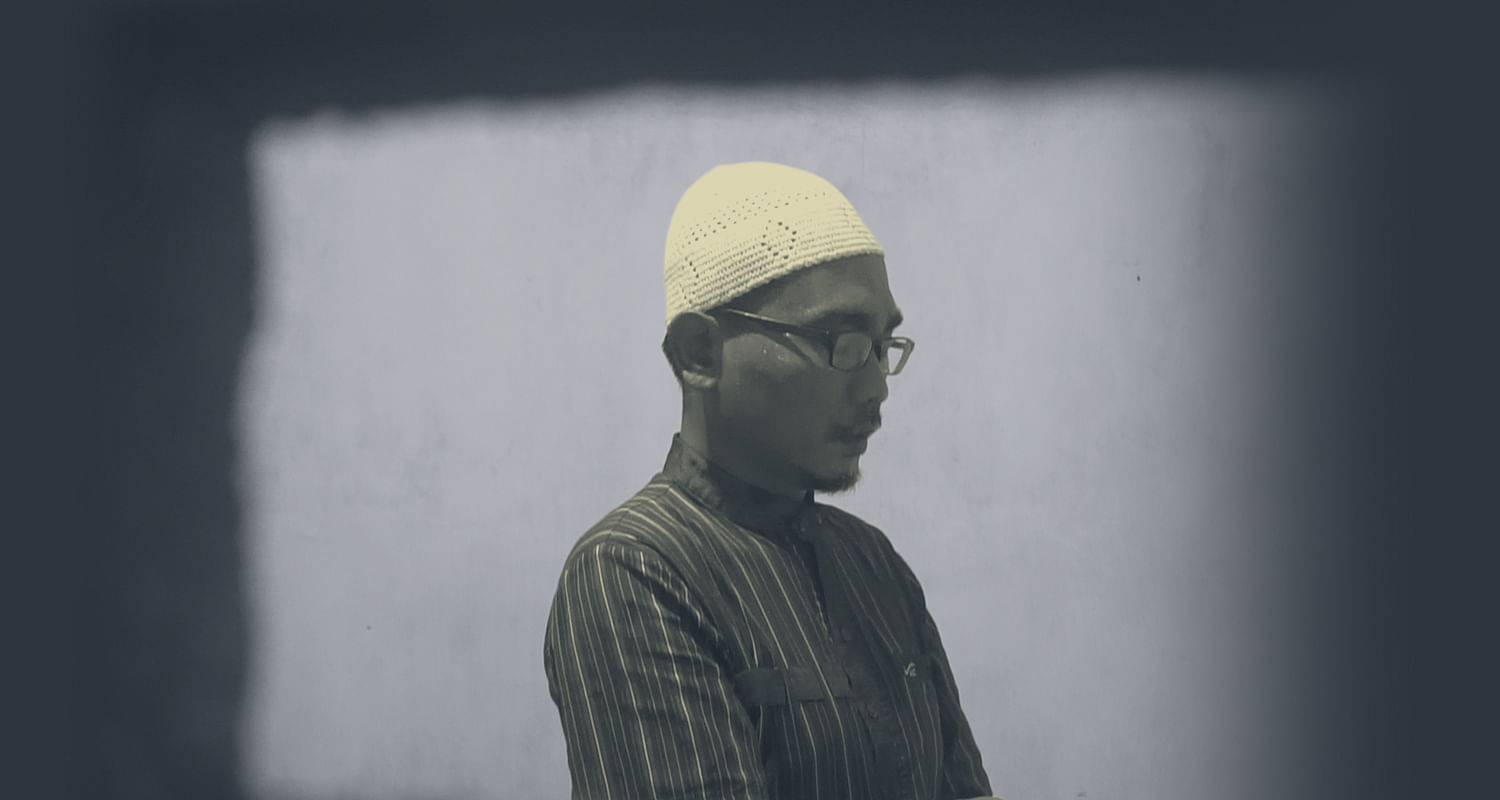
This is part of a weekly series of feature stories, videos and podcasts in which The Straits Times correspondents cast the spotlight on people and communities around the region who are living in the shadows of their societies where they exist largely unseen, unheard and little talked about.
SINGAPORE/YOGYAKARTA – On a regular weekend, Kopi Gandroeng is a bustling scene of youth and college students hanging out over food and coffee.
Tucked away among a clutch of universities and student hostels in Indonesia’s historic city of Yogyakarta, the coffee shop – like the millions of warong (eateries) across the Java island – is a popular place for young Indonesians to dine and socialise.
But Kopi Gandroeng serves a far greater purpose: To prevent disillusioned youth from becoming radicalised.
It is a mission driven by one man’s desire for redemption.

Kopi Gandroeng’s founder Muhammad In’am Amin, 44, had never heard of the Islamic State in Iraq and Syria (ISIS) until the day he received news of his youngest brother’s death – some 8,200km away in Baghdad.
Wildan Mukhollad had died carrying out a suicide car bomb attack in February 2014. He was the first Indonesian to die fighting for the violent terror group ISIS in the Middle East. He was only 19.
His act made his family – the ignominious relatives of a terrorist – outcasts in their home town. On top of that, Mr In’am grappled with guilt over not having saved Wildan from his fate.
Kopi Gandroeng is now a counter-terrorism bastion, where the weapons against radicalisation are coffee, friendship and education.

Allied with a few reformed radicals in this mission, Mr In’am runs a programme to pull youth back from the brink of extremism, and to help former terrorism convicts reintegrate into society.
It is a soft war against radicalism, as much as a reparation for his brother Wildan’s transgressions.
From selfies to rifles
Born and raised in Lamongan, East Java, Wildan had aspired to be a religious cleric. As a student at a local Islamic boarding school, he was among the brightest in his class, and is remembered fondly by those who knew him as intelligent, soft-spoken and well-mannered.
“At 17, he memorised the Quran the way nobody else at his age did. Not even his peers or other children and grandchildren in the family could do what he did,” said Mr In’am, of his brother.
In 2011, Wildan left home for the first time for Egypt. He had clinched a scholarship to study the Arabic language at the Al-Azhar University in Cairo.

The first year went well. Wildan would call home and send pictures of the tourist landmarks he had visited and selfies with college mates he had befriended on campus.
But a year later, he started expressing his desire to join jihad, or the Struggle. It was the year when the civil uprising against the government of President Bashar Al-Assad in Syria deteriorated into a violent civil war.
The conflict was exploited by ISIS, which aggressively recruited militants to carry out a campaign of massacre against thousands of people who did not measure up to its own extreme version of Islam.
“‘My friends have all sacrificed themselves but I haven’t yet. I want to die as a syahid (martyr) here,’ he would say. It was very clear that he wanted to die there,” Mr In’am recounted.
“He even showed us a picture of him holding a Kalashnikov rifle, which he carried with him everywhere, even when he slept. I tried so hard to convince him to come home but it was futile. We couldn’t get hold of him after that.”

Starting a new life
Then, news broke of Wildan’s death by suicide bombing.
“My mother had never been more devastated, hearing the news. The whole family was at a loss as to what to do,” said Mr In’am.
In the ensuing months, the grieving family also endured being vilified as “the family of the terrorist” and probed by law enforcers for suspected terrorist links.
The villagers “excommunicated” the family, Mr In’am said.
“Before, we got along with many of our neighbours, and those we couldn’t get along with would at least act friendly though they talked behind our backs, and that’s quite normal in a village. But after Wildan’s death, everyone avoided us.
“They also started calling me a terrorist. That was why I moved to Yogyakarta.”
Having made the 320km move from Lamongan in 2015, Mr In’am mulled over what he could do to prevent others from following in his brother’s footsteps.
He and a few friends then started a counter-terrorism organisation called Yayasan Lingkar Perdamaian (Peace Network Foundation), reaching out to youth from Kopi Gandroeng and guiding them out of the rabbit hole that is Islamist extremism. They also support former terrorists, by giving them a job, for instance.
Working at the cafe, the youth get to mingle with patrons around their age – usually students from the universities in the area – and forge new social networks.
“Our purpose is to create a new community so that former terrorists won’t fall back to their old social networks,” said Mr In’am. “They come here and talk about politics and so on. We hope that through that, we can put a stop to the insidious information they receive.”
Youth are sometimes referred to him by friends in the tight-knit network of counter-terrorism activists, which includes well-known reformed terrorists like Ali Fauzi, a former key member of Jemaah Islamiah, whose brothers Mukhlas, Amrozi and Ali Imron orchestrated the 2002 Bali bombing that killed more than 200 people.
Since its foundation in 2016, Yayasan Lingkar Perdamaian has successfully dissuaded many young people from becoming terrorists. It is an effective alternative to government-run deradicalisation programmes, which for all they are worth have their shortcomings.
This was evident in some of the recent terror attacks linked to ISIS, where many of the perpetrators were found to be recidivists. Among the attacks were the 2016 Jakarta gun and bomb attacks and the April 15 ambush on police forces in Poso last year.
Since 2019, Indonesia’s counter-terrorism agency has arrested about 525 terror suspects and killed at least six who resisted arrest.
In Central Java alone, there are 230 terrorists in jail, and another 120 who have been released. The province, where Yogyakarta is located, has the second highest number of terrorists in Indonesia after Poso, Central Sulawesi.
Touching hearts, not breaking men
By one estimate, 50 of the 850 terrorists who have been released from prison since 2002 have gone back to their old ways.
Dr Noor Huda Ismail, the founder of Ruang Obrol, an Indonesia-based initiative aimed at rehabilitating radical Islamists, said rehabilitation programmes run by the government – usually conducted behind prison walls – focus too much on breaking the inmates’ radical beliefs.
This does not work on fundamentalists.
“They are obsessed with challenging the ideology first. In reality, that is like putting the cart before the horse. They will reject you,” he said, adding that a better approach would be to win their hearts and minds first.

Terrorists arrested are sent to Jakarta for rehabilitation, but there is a lack of support on the local government level in following up on them after they are released and return to their home towns, Dr Huda said.
“That is where we start to see recidivism. The former convicts might not be involved in terror activities but they might encourage others to carry out attacks and we don’t want that.”
Dr Huda said informal deradicalisation initiatives like Ruang Obrol have something that the mainstream programmes do not: They are imbued with a human touch and, more importantly, provide sustained support that makes radicalised youth feel secure enough to completely cut ties with their old social circle.
“They are more personalised to cater to different individuals instead of lumping them together in the same box. To effectively disengage the extremists, we must first win their ‘hearts’, and then give them a ‘hand’ before we change the ideology in their ‘head’. That’s what I called the triple-H approach,” said Dr Huda.
“You have to know that the same intervention that works in one place might not work in another place.”
The counter narrative
Like the several hundreds of families that have lost their loved ones to ISIS, Mr In’am has had to move on from the personal tragedy that haunted him for years.
But he struggles to forgive himself for not being his brother’s keeper.

“As the eldest in the family, I’m responsible for my siblings. But I didn’t give Wildan any money when he was leaving for Egypt. Other families were giving their children everything but I could afford nothing. I was in financial distress and ill at that time. Wildan came to bid me farewell when I was lying ill in bed,” said Mr In’am.
Friends in Indonesia that Wildan had kept in touch with told Mr In’am that the teen had been actively recruiting Indonesians to join ISIS in the Middle East, even in the final days before his suicide attack.
“He was making contacts with the Indonesians here and recruiting them to join him. Many went. If Wildan was still alive, he could’ve been made a leader of sorts,” said Mr In’am.
“These young people are at an age where they’re finding an identity and maybe because they’re bored with life, many decided to hijrah (abandon secular habits for a more religious way of life). But without a strong foundation, they are easily influenced by the wrong teachings,” said Mr In’am.
“They listen to the words of war and the words of jihad. We want to remind them that the Quran also contains words of tolerance and teaches mercy to all creation and the importance of kindness, before it becomes too late to bring them back.”
If his brother were still alive, he would have done the same thing for him.
- Additional reporting by Ratmurti Mardika in Yogyakarta



